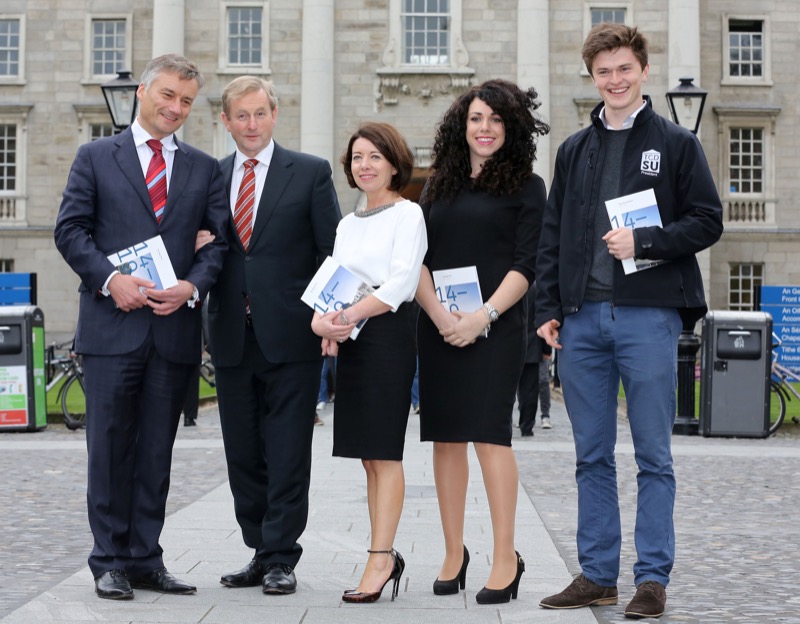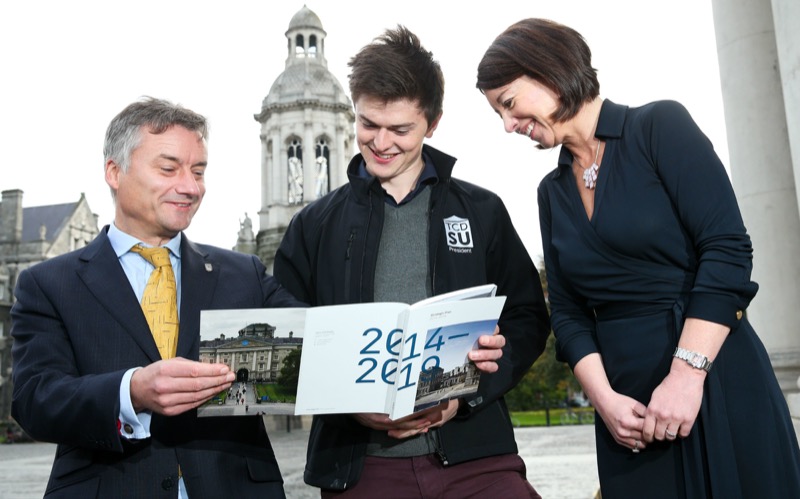Trinity College’s New Five-Year Strategic Plan
Posted on: 22 October 2014
Strategic Plan 2014-19 includes:
- Three new major capital projects: Trinity Business School, E3 – Engineering, Energy and Environment Institute and the Cancer Institute at St James’s Hospital
- Increase student enrolments from outside the EU from 1,580 to almost 3,000
- New student residences for 2,000 students
- Increase student online learners to 1,000
- Trinity as creative arts catalyst in Dublin city
Taoiseach, Enda Kenny, will today launch Trinity College Dublin’s new Strategic Plan 2014-19 that aims to deliver for Ireland as a global leader in education, research, innovation, and that will enable job creation.
The five-year plan will cost €600 million and will be funded in large part from non-exchequer funding.
Speaking ahead of the launch of the Strategic Plan 2014-19, Taoiseach, Enda Kenny said: "Trinity's Strategic Plan fits well with the Government's determination to secure Ireland's economic recovery by supporting job creation and attracting investment. The focus Trinity has on developing strong partnerships with enterprise and building alliances between employers and the academic community is critical and this is backed up by strong capital investment. I wish you every success with increasing student enrolments from outside the EU and your ambitious target of supporting the creation of more than 160 start-up companies over the next three years, which will make an important contribution to Ireland’s economic recovery."
Taoiseach, Enda Kenny's speech can be read here.
Trinity Provost, Dr Patrick Prendergast said: “As a university of global consequence, we will be known for realising student potential and for research and scholarship that benefits Ireland and the world.”
Dr Prendergast's speech can be read here.

The Strategic Plan 2014-19 will include three new major capital projects Trinity Business School, E3 – Engineering, Energy and Environment Institute, and the Cancer Institute at St James’s Hospital, that will drive excellence in research for the benefit of society.
A €70 million Trinity School of Business, co-located with an Innovation and Entrepreneurship Hub, will drive a spirit of entrepreneurship across the campus and in Dublin city centre. It will support a growing culture of job creation among Trinity's students and faculties, and help position Dublin as a global node for innovation and start-up enterprises. Construction is scheduled to commence in 2015.
The new E3 – the Engineering, Energy and Environment Institute – will be the first institute of its kind in Ireland and internationally to integrate engineering, technology and the natural sciences, at scale. It aims to educate the next generation of talented engineers and scientists address major challenges such as sustainability. It will contribute to growth competitiveness for Ireland.
The Cancer institute will consolidate cancer care, research and education on one site in St James’s Hospital, Dublin with the aim of improving cancer treatment based on cutting-edge research.
The five-year plan aims to maximise research impact, building on Ireland’s global reputation as a location for knowledge creation.
It will define a priority Global Research Question focusing Trinity’s research activities in meeting global challenges that will have long-term positive global impact.
Enabling this research it has a funding target of €125 million from the EU Horizon 2020 programme and doubling direct research funding by securing €20 million from industry.
As part of Trinity’s global engagement, student enrolments from outside the EU will increase from 7.8 to 18%, from 1,580 to almost 3,000 students, while ensuring that all existing opportunities for Irish and EU students are maintained. Trinity as a world class educational institution will continue to attract students of the highest calibre from all continents. This will be further enabled by the development of strategic partnerships and joint partnership degree programmes with institutions globally.
It will also increase the percentage of underrepresented groups enrolled on undergraduate courses to 25% in 2019. In the last academic year the percentage was 20% (575 students) from underrepresented groups among new entrants.
New student residences will be developed to house up to 2,000 students on and near the campus, including construction of a new student hall at Oisín House on Pearse Street, Dublin.

In online education, it will increase the numbers of student online learners to 1,000, on up to 20 courses, focusing on postgraduate and continuous professional development (CPD), a strategy of lifelong learning meeting Ireland’s current and future economic and social needs. It will create global learning communities through high quality Massive Open Online Courses (MOOCs).
A digital transformation is also underway with new technologies fundamentally changing how education is delivered and experienced. In the period of this plan a college-wide information technology strategy will be implemented that cuts across the whole campus – from online education to communications, from alumni relations to the Library – and enable these activities with supporting IT infrastructure.
Trinity also aims to play a strong role in helping to catalyse the creative and cultural arts in Dublin city. Strategically connecting research and education to creative practice in the city, and linking them to European and global networks. It will launch Trinity Creative, a curated programme in existing spaces and establish the Connector, a multipurpose creative space in Dublin’s city centre attracting talent and creating the right conditions for creative entrepreneurship.
“Every great advance that Trinity has made has been in partnership with others including other global universities, collaborators in research, both government and local government, industry and philanthropy; it is partnerships that enable Trinity to enhance its standing as a place of learning, and Ireland’s reputation as a civilised society giving equality of opportunity to all with the talent and ambition to succeed,” concluded, Provost, Dr Prendergast.
On the occasion of the launch the Provost emphasised the role of innovation, technology, and industry collaborations and their importance in the development of all disciplines. In particular their importance in presenting our world-ranking arts and humanities research to new global audiences. Trinity's Down Survey research project was cited as an example. A quarter of a million people round the world have accessed the innovative, interactive analysis of 17th century landholding in Ireland, constructed by the College's historians in collaboration with Google Maps. The Survey maps the forfeit of land after the Cromwellian invasion. As an example, he displayed the map of County Mayo and showed the Taoiseach the area he is from, Islandeady, outside Castlebar, which was owned by the McPhilbin family until the 1650s, when they lost everything to a Protestant from Longford, the well-named Sir Thomas Newcomen. The Taoiseach was presented with the map at the end of the launch.
Visit the Strategic Plan web pages at www.tcd.ie/strategy.
Additional Notes
About Trinity College Dublin
Trinity College Dublin, founded in 1592 is Ireland’s oldest university and today has a vibrant community of 17,000 students and 3,000 staff. There are 103,000 alumni worldwide. Trinity is recognised internationally as Ireland’s premier university. Cutting edge research, technology and innovation places the university at the forefront of higher education in Ireland and globally. It encompasses all major academic disciplines, and is committed to world-class teaching and research across the range of disciplines in the arts, humanities, engineering, science, social and health sciences.
Trinity is Ireland’s leading university across all international rankings, and is ranked 71st place worldwide and in the top 25 in Europe in the recent QS World University Rankings 2014. It is ranked in 138th place in the top 150 global universities in the Times Higher Education World University Rankings 2014 and the top 50 in Europe. It is ranked 80th globally and 27th in Europe in the Leiden University Rankings in terms of research performance.
Trinity College Dublin ‘s Strategic Plan 2014-19 Job Creation : contributing to Economic Recovery
€295m capital investment: including Trinity Business School (€70m), E3 – Engineering, Energy and Environment Institute (€150m) and The Cancer Institute at St James’s Hospital (€75m) will create 600 jobs a year over a 5 year period.
New student residences for 2,000 students: investment €170m: 300 jobs a year for 5 years.
Student enrolments from outside the EU will increase from 1,580 to almost 3,000 in five years: indirect employment in the local economy would increase to an estimated 400 jobs.
Trinity College Dublin ‘s Strategic Plan 2014-19 New revenue streams
New revenue streams articulated in this plan have set the aim of a 60% non-exchequer budget by 2019: this would translate to €210m each year generated by Trinity from non-exchequer sources on a recurrent basis.
